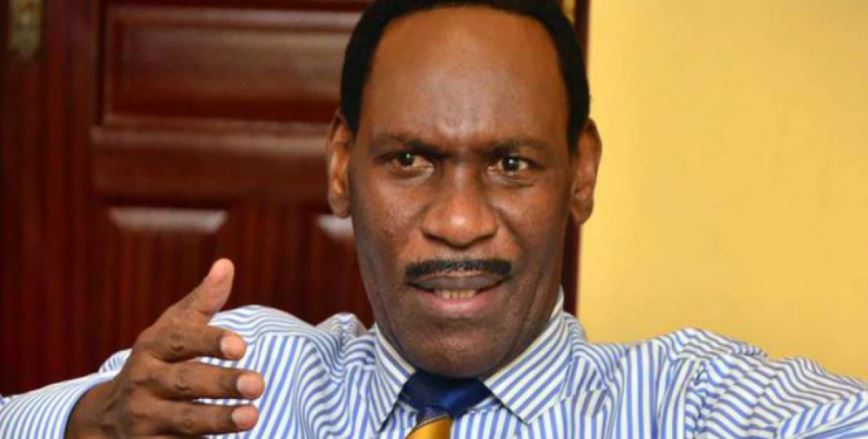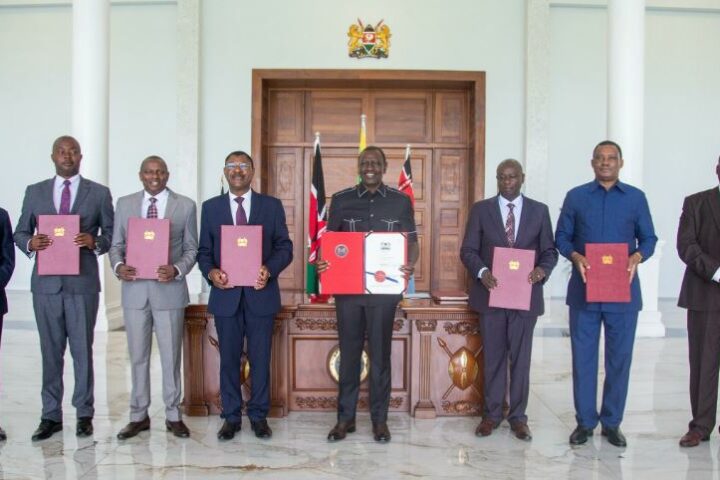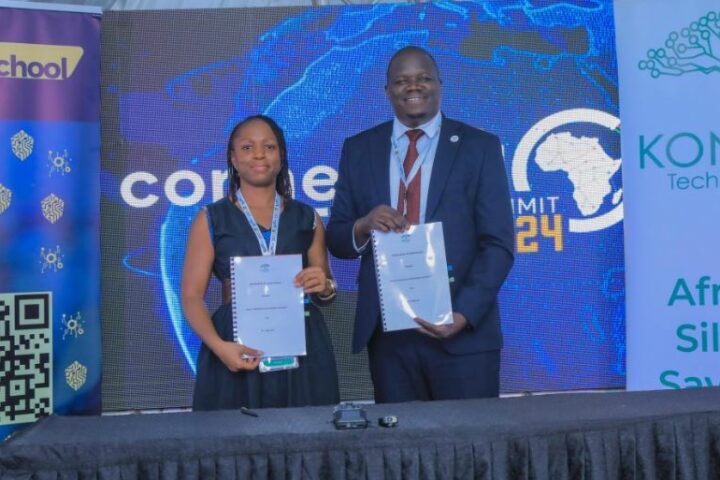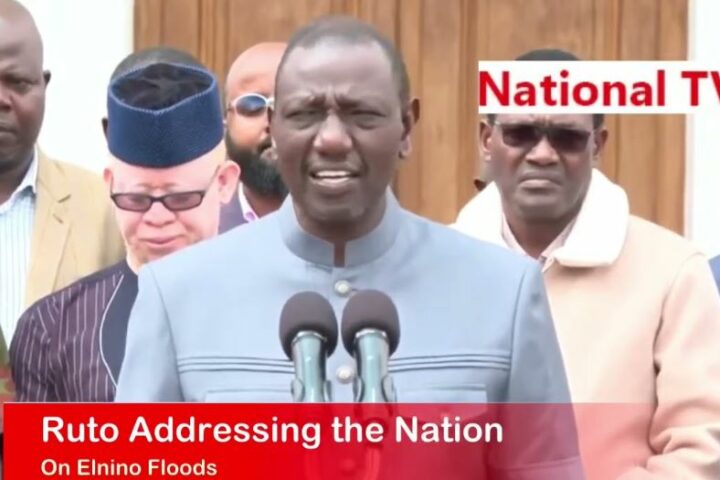
The ‘moral cop’ or ‘deputy Jesus’ as he is infamously known on social media shared his career journey with the Sunday Nation.
Tell us about your childhood and family life.
I was born in Mwala, Machakos County in June 1967 as the fifth born in a family of 11 children. I have been married to the love of my life for 25 years, and together we have two adorable children.
Educational background.
I hold a Ph.D. in Communication Studies from Moi University, a Master’s Degree in Communication Studies from the University of Nairobi, and BA (Sociology and Linguistics) from Kenyatta University. I also hold an honorary Doctorate Degree in Public Administration from the Commonwealth University.
Share with us your career journey.
I started my career at the Nation Media Group where I practiced as a journalist for nine years, rising from a trainee reporter to an editor. While here, I joined the Kenya Union of Journalists where I served as the Secretary-General from 2001 to 2007.
I went on to join the Public Service as the Director of Information and Public Communications at the Ministry of Information, Communication and Technology and later rose to become the Information Secretary in the same ministry where I served until 2015. During my tenure as the Director of Information, I was awarded the Moran of the Burning Spear by the President for my outstanding contribution in service to the country.
Throughout the years, I have served as a director in various state agencies key among them Brand Kenya Board, the Kenya Vision 2030 Secretariat, Kenya Broadcasting Corporation (KBC), Media Council of Kenya and the Kenya Copyright Board.
In October 2015, I joined the Kenya Film Classification Board (KFCB) as the Chief Executive Officer, a position I have held to date. The board’s key mandate is to regulate film and broadcast content intended for public consumption with two main objectives; to protect children from exposure to harmful media content, and to promote Kenya’s culture and moral values through film.
As the Chief Executive Officer, my key responsibilities include ensuring the effective dispensation of this mandate as well as smooth and efficient communication between the board and the management as well as various stakeholders.
What do you remember most about your career journey?
I have so many memorable moments but two stand out; the short stint I served in the 2002 Kanu presidential candidate Uhuru Kenyatta’s campaign team when he first ran for president in 2002 and my role as Director of Information and Public Communications in managing information during the mediation process following the 2007/8 post-election violence in Kenya.
In any case, the intellectual depth of the Kanu candidate, his extremely likable person and friendly demeanor which were not known to many people then was very refreshing. The Uhuru I was packaging was not the Uhuru many people were calling naïve and a political novice. He was sharp and shrewd to the core, urbane and suave, yet he bore a raw innocence and the common touch of a village boy.
In the second incident, my close interactions with the eminent persons, led by the late Kofi Annan, the late Benjamin Mkapa and Graca Machel and visits to the hot spots of the skirmishes and emerging IDP camps, the efforts by Annan to persuade the warring communities to stop fighting and getting the media to join the campaign for peace was one of my most trying yet fulfilling career moments. I was Annan’s interpreter most of the time when we flew to the villages.
My role in the digital migration process in Kenya in 2015 while serving as the Secretary of Information was another unforgettable moment. Handling the intricate process and working closely with the then ICT Cabinet Secretary Dr Fred Matiang’i was something I will never forget. As Secretary of Information and the highest-ranking officer in the Government Information and Communications officer’s cadre, I was managing critical aspects of the process especially Media/Government relations and flow of accurate and timely information.
There was so much hostility and opposition to the process by media owners and the matter went up to the Supreme Court. Then after the Government won, the TV stations switched themselves off in protest and there was no TV in Kenya for three weeks. We stood our ground that digital migration was an idea whose time had come.
How have you progressed over the years career-wise?
I believe I have grown to become one of the best in my field in terms of training, practice and experience. I do not know anyone else in Kenya who has had the privileged three dimensional view of the media like myself. Having practiced journalism for nine years with NMG, the then leading media house in East and Central Africa, served as KUJ Secretary General for seven years, then Director of Information and Public Communications, then where I am now as a regulator of media content and with my academic credentials – Masters in Communication Studies from the University of Nairobi and a PhD in Communication Studies from Moi University, I believe I have become an authority in matters media and strategic communication. There’s still more to learn and to achieve, but I believe I am today a reference point on matters media and communication, not just in Kenya but in Africa.
What has been a key driver of your growth?
My greatest drive in life is passion and an insatiable desire to get things done. I just love excellence and I have unexplainable energy to achieve results. When I commit my mind I can stay a whole day without eating anything and not even realize it as long as I am engrossed in the pursuit of a goal. I am also fiercely loyal to authority and to friends. My biggest weakness is that I am always very impatient with mediocre or lazy people.
I am in many ways a perfectionist and that sometimes makes me easily fall out with fellows who embrace the culture of anything goes. I also have open disdain for people who do not uphold teamwork. Nothing frustrates me like when playing my favourite game of football and I pass the ball to someone then they do not pass to other members of the team or at worst decide to score an own goal.
However, as I grow older I have learnt not to expect other people to be like me or to treat me with the same respect and kindness I treat them. Life is not always fair. Sometimes people you love or have helped can give you a kick in the teeth or betray you big time. I have had to nurture the gift of goodbye and adapting to being disliked even by relatives and colleagues. I have learnt not to let anything or anyone matter too much. Only God does and as long as I feel right with God and my conscience is clean, then I am just fine no matter who likes or does not like me.
Who are the people or relationships that you can single out that were useful in your career growth and how did they influence your trajectory?
I have been blessed to have learnt from some of the best minds in the country. Among my mentors are Interior Cabinet Secretary Dr Fred Matiang’i, who I worked with at the Ministry of Information for three years. I have also worked with former ICT Permanent Secretary Dr Bitange Ndemo, Wilfred Kiboro of the Nation Media Group and former Vice President Kalonzo Musyoka.
The technical depth of Dr Ndemo, the personal touch of Dr Kiboro and the no-nonsense and assertive approach of Dr Matiang’i have all influenced my style of leadership at the board. The diplomatic mien of Mr Musyoka, his love for God and family are worth emulating.
I am also very proud of my colleagues at the Kenya Film Classification Board. No one can achieve great things alone and I am blessed to have a strong team at KFCB that believes in integrity and puts in great effort to get results.
Key decisions you might have taken along your career?
Perhaps one of the key decisions I have made was that of moving from being the Secretary-General of KUJ into the public service in 2007 as Director of Information and Public Communications. I feel I have made the most impact in my career as a media professional.
When I was appointed to the present position of KFCB CEO in October 2015, the board had been for decades, a low-key state corporation without visibility or much appeal. In fact, many people thought I was making a bad decision in choosing to sit at the helm of what was at the time a nondescript and moribund institution whose mandate was little known, if at all.
However, I saw the potential and committed to revamping the body, and I am proud to say that during my tenure, the board’s fortune has seen a remarkable turnaround. Today, KFCB has immense visibility and without blowing my own trumpet, I believe I have brought a breath of life to the corporation and revamped its appeal.
Slightly before my appointment to the body in 2015, KFCB had an annual budget of Sh88 million. Right now, our budget has bulged to more than Sh600 million in terms of assets and the worth of our partnerships.
Additionally, it is during my public service, and particularly as the CEO of KFCB, that I have managed to do the most as far as shaping communication on protecting children from harmful media content goes.
I have created a national conversation about the need to protect children from premature exposure to adult content and the role of media in promoting Kenya’s culture, moral values and national aspirations. What children see and hear and how they are socialised influence the kind of adults they grow up to become, and consequently, the society.
The kind of environment that children grow up in shapes their perception of life even in adulthood, and in this regard, therefore, I feel that as a country, we owe it to our younger generation the responsibility to create a morally safe environment. A nation that does not protect its children has no future.
What would you tell your younger self?
I would tell my younger self to strive to be Dr Ezekiel Mutua – God-fearing, hardworking and honest. I would tell them to believe in themselves and to know that one does not have to have a godfather to make it in life. That if you are disciplined, honest and hardworking you can be successful no matter what your background is like.
What would you advise the youth in Kenya and Africa today?
Our young people must know that they are Africa’s hope of today and tomorrow. Our youthful population – healthy, educated, innovative and inquisitive – is the greatest resource Africa has. The only challenge is the breakdown of our moral fabric and the culture of instant gratification that makes youths want it now and here.
They avoid processes, the effort, patience and the hard work it takes to succeed because they see adults who do not value integrity and became overnight millionaires. I urge our youths to ignore peer pressure and get role models who can make them accountable and responsible.
Above all, I advise our innovative youths to honour God in their talents and creativity, respect elders and those in authority and learn to express themselves boldly and candidly without being disrespectful, hateful or breaking the law. I advise them to use social media platforms responsibly and safely.
Future plans?
I have a dream that one day I will be a big and influential person in Kenya. I do not know how, but I have a dream that one day I will impact the cause of development in Kenya by helping the country to build its development blueprint on the basis of moral values. I do not know how I will get to achieve this dream, but with God all things are possible.
Your final words?
In life, there is no substitute for integrity. Nations rise or fall on the basis of their moral values. Kenya is a great country with a huge potential but our moral fabric is broken. We have built the hardware but ignored the software. Unless and until we get back to the basics and fix the software by building a solid moral foundation for Kenya, development and sustainable peace will always be elusive.
The negative politics and obscene content on our media today has a huge bearing on the kind of country we shall bequeath our children. We must get our media to change from the obsession with negative stories and embrace a balance in order to build a strong moral foundation and ensure a safer future for our children.
In a world full of hate, wars, famine and breakdown of values, I urge artistes to endeavor to create content that inspires hope, and heals the world. In the words of the late Michael Jackson, “We must heal the world and make it a better place.”






